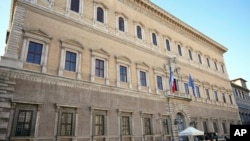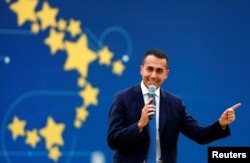When France last recalled its ambassador from Italy it was 1940 and Benito Mussolini had just used the opportunity of the Germans marching into Paris to declare war on his northern neighbor.
The backdrop to the withdrawal last week by the Élysée Palace of its ambassador to Rome following months of slurs traded between the country’s leaders, amid disputes over migration policy and Libya, was not accompanied by the thump of artillery shells.
Nonetheless, it has prompted rising fears that the recent public bickering between two of the European Union’s founding members is only just getting started and could spark even more serious retaliatory action.
Some Italian commentators and industrialists have warned the feuding, driven by internal political dynamics on both sides of the Alps, risks boiling over into the economic sphere.
“Given the intricate geopolitical, economic and commercial ties between the two countries, there is no shortage of areas in which the French could make us pay,” Lucio Caracciolo, director of the Limes geopolitical review, wrote recently in an article for Italy’s La Repubblica newspaper.
He added, “France’s retaliatory strikes will be visible only to those who need to see them, fired with a silencer.”
Certainly, the quarrel is unlikely to abate anytime soon, until at least after European parliament elections in May, say analysts.
Diverging views on future of Europe
Neither side has much reason to stop the feuding before then. France’s centrist, cosmopolitan president, Emmanuel Macron, who sees himself as the champion of Europe’s embattled open, liberal order, and a new breed of iconoclastic populist Italians eager to block greater European integration, are locked in a contest to re-shape not only their own countries but also to determine the future trajectory of the European Union.
The immediate cause for the French envoy’s recall by an infuriated Macron was a meeting in Paris between deputy Italian Prime Minister Luigi Di Maio, head of Italy’s anti-establishment Five Star Movement, and luminaries of France’s Yellow Vests (gilets jaunes) movement, the sometimes-violent mass protest which aims to oust Macron. Di Maio offered the Yellow Vests support in organizing their protests - an extraordinary departure from traditional diplomatic norms.
But the barrage of attacks involving Italy’s populist leaders and Macron has been pushing Franco-Italian relations close to the brink for months.
Feud escalates
In June, there was an ugly spat over the closing by Matteo Salvini, Italy’s interior minister and head of the nationalist Lega party, of Italian ports to humanitarian rescue ships carrying migrants from Africa.
Macron scolded the Italian government for “cynicism and irresponsibility,” triggering a tit-for-tat exchange of insults with Salvini, with other ministers on both sides piling on. A spokesman for Macron’s party La Republique en Marche declared, “The position, the line of the Italian government, makes you want to vomit.”
And it has been downhill ever since with flaming disputes over Europe’s budgetary rules.
In a Facebook video last month, Salvini said, “I hope the French will be able to free themselves of a terrible president. The opportunity will come on May 26 (the European elections) when finally the French people will be able to take back control of their future, destiny, (and) pride, which are poorly represented by a character like Macron.”
Until recently, the cross-border arguments over European migration and economic policies and disagreements over what strategies to pursue to stabilize an anarchic Libya featured mainly Salvini and Lega ministers, but with Italy’s M5S sagging badly in opinion polls, Di Maio has now entered the fray, pouring oil on the cross-border political fire.
On Sunday, Di Maio’s party, which is in an unstable coalition government with the Lega, fared poorly in a bellwether regional election in the mountainous Abruzzo. M5S saw its support in Abruzzo halved, taking only a 20 percent share of the vote. Salvini’s surged past its coalition partner, capturing 28 percent.
The Abruzzo vote confirmed that the Lega is now electorally the stronger party in a coalition it entered as the junior partner and is fast eclipsing Di Maio’s party. Even before Sunday, M5S was worried that Salvini might try to implode the coalition government and engineer an early national election in Italy, enabling him possibly to dump Di Maio altogether. Hence, Di Maio wading into the battle with Macron and trying to out-shout Salvini to become the French president’s fiercest Italian critic.
The revival of nationalism
As the European elections loom and Italian political dynamics play out, the sparring between Paris and Rome is likely to worsen, risking inflaming long-held nationalist resentments going back centuries that Italians and French harbor about each other.
Neighbors they may be with much in common, including a love of food, fashion and style, but the two countries have rubbed awkwardly against each during times of peace and have had a history of warfare that French and Italian nationalists are trawling now to sharpen their verbal insults.
On both sides of the Alps, tabloid newspapers and enraged commentators have piled on launching barbs of their own, with the French pouring scorn on the disorganization of the Italians and their stalled economy and the Italians retaliating with denunciations of French arrogance.
The feuding has even impacted the celebration of the 500th anniversary of Italian artist Leonardo da Vinci’s death with the Italians accusing the French of showing disrespect in “high-handed” demands made by Paris’ Louvre museum for paintings held in Italy it wants for a Leonardo exhibition later this year.
In a slight, Lucia Borgonzoni, Italy’s undersecretary for culture and a Lega member, offered the Louvre reproductions and accused France of trying to take center stage in the Leonardo commemorations by “putting Italy on the margins of a major cultural event.”
If the spat starts leeching into the economic realm, France has the greater ability to harm its neighbor than the other way around. Carlo Alberto Carnevale Maffe, a professor of business strategy at Milan’s Bocconi University, told Bloomberg, “The French can harm us by reducing credit and investment, in sectors from luxury to pharmaceuticals, and food and beverage.”
France is Italy’s second-most important trading partner, after Germany, and Italy exports more to France than vice versa. There is already speculation that Air France may pull out of a deal to buy Alitalia, Italy’s ailing national airline. Italian newspaper Il Sole 24 Ore has reported that Air France is considering stepping away from rescuing the Italian airline not on commercial reasons, but because of “political motives.”












